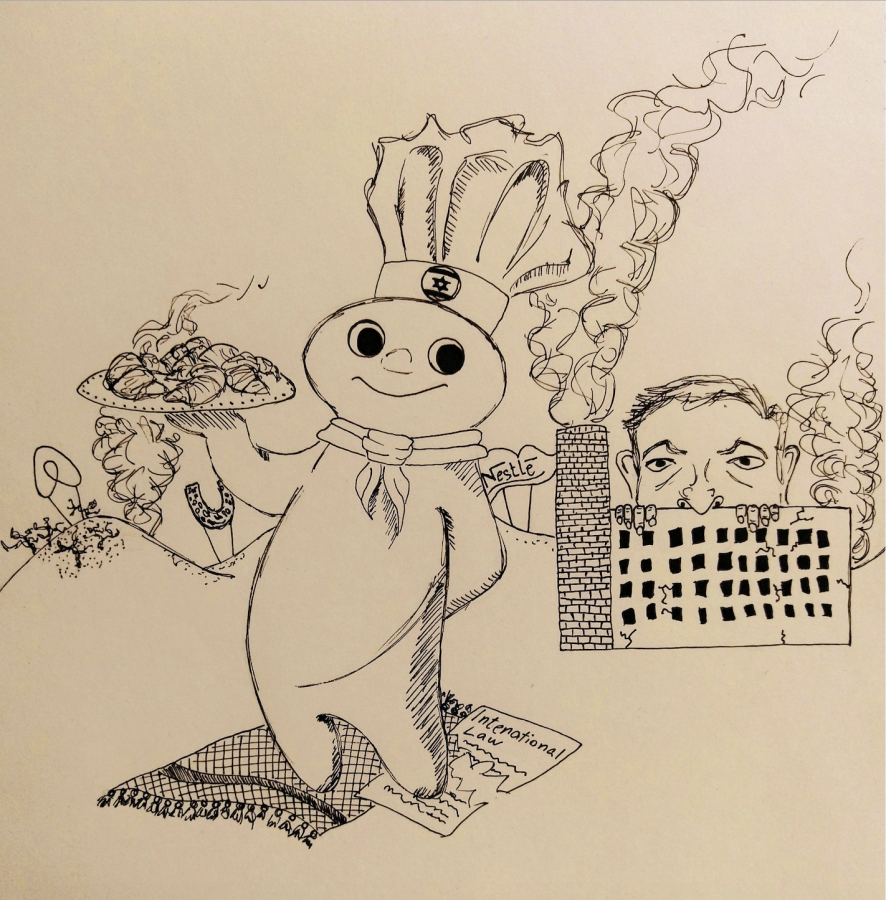Say no to Pillsbury dough
October 29, 2020
It’s that time of year again: sweater weather, curling up around the fire with hot cocoa and eating “freshly” baked goods brought to you by Pillsbury — made in the illegally occupied West Bank since 2002.
During the holiday season, several of the traditions we have are directly connected to the products we buy. For families like my own, Pillsbury products have been used as a way to bring the family together with little to no effort in the kitchen. The Pillsbury Doughboy is a direct reflection on American consumerism, with a smile. It seems as though everyone knows the cute little Pillsbury Doughboy, but very little of how Pillsbury or General Mills makes their products. Simply put, General Mills, who makes Pillsbury products, directly profits off of the exploitation and militarized occupation of Palestinian land.
On Feb. 12 of this year, the United Nations Human Rights Office published a list of 112 companies that are doing business within illegal Israeli settlements in occupied Palestinian territories as defined by the UN, specifically in Article 49 of the Fourth Geneva Convention and by the International Criminal Court (ICC). General Mills is one of the companies listed that owns and markets brands like Betty Crocker, Häagen-Dazs, Cheerios, Cocoa Puffs, Lucky Charms and of course, Pillsbury. General Mills found itself on the list because of a factory in an Israeli illegal settlement zone that produces Pillsbury bakery products, like bread and croissants.
General Mills has come out repeatedly with statements explaining that the factory workers are half Palestinian and half Israeli, receive employment benefits, safe working conditions and that General Mills is in “compliance with labor and human rights laws.” The fact of the matter is they are still exploiting Palestinian land and taking water and natural resources to supply their needs without any regard for Palestinian authority or autonomy. General Mills is simply continuing to profit from illegal occupation, no matter how much they frame it as a safe and inclusive working environment.

The Boycott, Divestment, Sanctions (BDS) movement calls to end international support for Israel’s oppression of Palestinians and aims to pressure Israel to comply with international law. It is a Palestinian-led movement, along with allies standing in solidarity, that recognizes that Israel is occupying and colonizing Palestinian land. Israel uses apartheid practices including discrimination of Palestinian citizens of Israel, denying Palestinian refugees the right to return to their homes and the annexation of Palestinian land.
The Quaker-affiliated American Friends Service Committee and Jewish Voice for Peace are two large proponents of Palestinian rights and have been boycotting Pillsbury and other companies listed with BDS; they have also been calling on others to join. The BDS movement is also heavily involved in most Students for Justice in Palestine movements on high school and college campuses. The BDS movement among students has become increasingly popular; as a younger generation, we have begun to realize what it means to be a consumer, and the power we have for making social change.
The BDS movement has allowed people to fully understand the scope of international and economic support when it comes to the illegal occupation and human rights abuses carried out by Israel. While the movement has been condemned by the United States within a resolution passed by the House of Representatives, individuals and groups have continued to promote the use of product boycotts to bring attention and awareness to how our consumption directly impacts and supports the practices these companies uphold.
As an active consumer, you must understand what you are consenting to and how the creation of a product directly affects someone’s quality and recognition of life. It is your responsibility to be a mindful consumer. Is there a tradition or product that is so important that you wouldn’t give it up, even with the knowledge of how it is produced?
The BDS movement upholds the idea that Palestinians are entitled to the same rights as the rest of humanity. It is our responsibility to support and stand in solidarity with calls for the boycott, divestment and sanctions against Israel and companies within occupied lands until they comply with international law and Universal Principles of Human Rights.






Rozina • Jun 28, 2021 at 12:42 am
No, it does not make people want to go out and buy these products but only opens up eyes to the hidden oppression of these so called companies
Up yours • Mar 1, 2021 at 12:48 am
Couldn’t agree more with anonymous.
Pilsbury doughboy is the best and writing this article has only encouraged us to buy more!
Anonymous • Oct 30, 2020 at 9:53 am
I’m going to buy some Pillsbury dough tonight just to spite the author and those who support them.